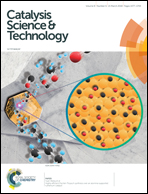Defective graphene as a metal-free catalyst for chemoselective olefin hydrogenation by hydrazine
Abstract
A series of defective graphenes containing or not containing N, B, S and other heteroatoms exhibited general activity as metal-free catalysts for the hydrogenation of C![[double bond, length as m-dash]](https://www.rsc.org/images/entities/char_e001.gif) C double bonds by hydrazine in the presence of oxygen. The best-performing graphene was the one obtained from the pyrolysis of alginate and subsequent exfoliation by sonication. The material was reusable in three consecutive runs without decay in its catalytic activity, and it exhibited 99% chemoselectivity for C
C double bonds by hydrazine in the presence of oxygen. The best-performing graphene was the one obtained from the pyrolysis of alginate and subsequent exfoliation by sonication. The material was reusable in three consecutive runs without decay in its catalytic activity, and it exhibited 99% chemoselectivity for C![[double bond, length as m-dash]](https://www.rsc.org/images/entities/char_e001.gif) C double bonds vs. nitro group hydrogenation in contrast with conventional Pd supported on carbon, which was almost unselective. Theoretical calculations using a model for defective graphene for styrene hydrogenation showed adsorption of the substrate by π–π stacking, resulting in activation of the double bond and direct interaction of cis-diimide with the C
C double bonds vs. nitro group hydrogenation in contrast with conventional Pd supported on carbon, which was almost unselective. Theoretical calculations using a model for defective graphene for styrene hydrogenation showed adsorption of the substrate by π–π stacking, resulting in activation of the double bond and direct interaction of cis-diimide with the C![[double bond, length as m-dash]](https://www.rsc.org/images/entities/char_e001.gif) C group.
C group.



 Please wait while we load your content...
Please wait while we load your content...